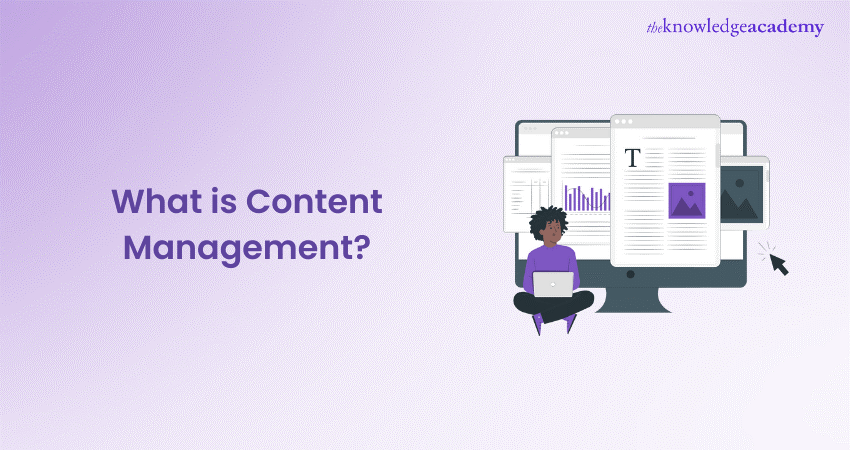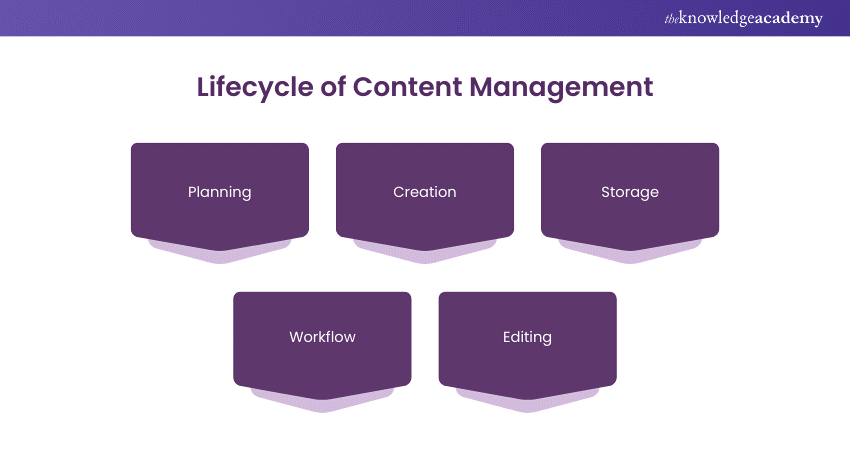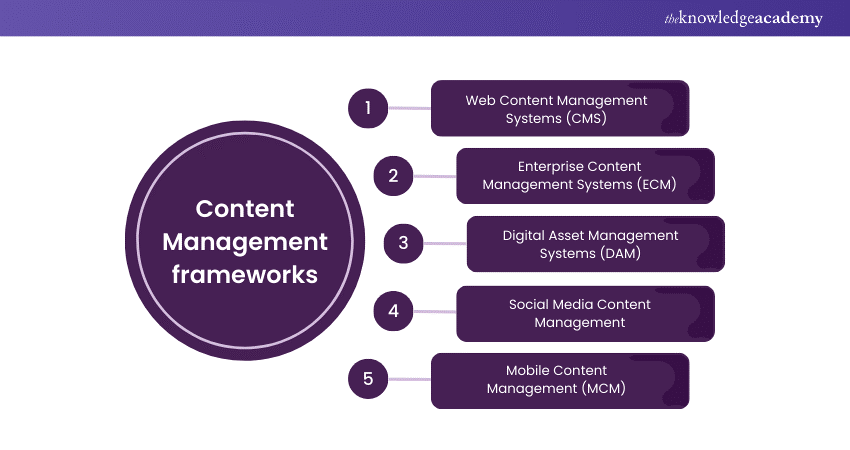We may not have the course you’re looking for. If you enquire or give us a call on +08000201623 and speak to our training experts, we may still be able to help with your training requirements.
Training Outcomes Within Your Budget!
We ensure quality, budget-alignment, and timely delivery by our expert instructors.

Content Management plays a vital role in delivering quality content that helps build traction by tactically engaging the audience. This blog will explore the definition of Content Management, its importance, different types and effective tips for managing content. Additionally, it will also explore its lifecycle and different frameworks.
Table of Contents
1) Definition of Content Management
2) The Importance of Content Management
3) Structured and unstructured content
4) Content Management lifecycle
5) What are Content Management strategies?
6) Different types of content strategy
7) Content Management frameworks
8) Four tips for effective Content Management
9) Conclusion
Definition of Content Management
Content Management is the systematic method of planning and generating content. The process includes research, work dissemination, content creation, and delivery plans to attain the desired business goal. It aims to organise and create captivating content that delivers the desired engagement levels.
The importance of Content Management
To make headway in the current content network, you need a well-organised plan to convey your content in the most captivating manner. Here are some suggestive pointers to help you manage your content effectively.
1) Reduction in operating costs
Having control over the content you deliver is very important. The content you put out needs to align with your business goal. You can control the quality of your content by framing guidelines like a style guide and colour palette to maintain consistency in the tonality of your content.
2) Enhanced control over content
Having control over the content that you deliver is very important. The content that you put out needs to align with your business goal. You can control the quality of your content by framing guidelines like a style guide and colour pallet to maintain consistency in the tonality of your content.
3) Streamlined delivery
Directing the content to the intended audience is essential. To achieve the desired engagement, you will need to identify the audience with whom the content will resonate. Once you've determined the target audience, you will need strategies for grabbing their attention so that they will consume and engage with your content.
4) Increased efficiency
Consistency is critical in Content Management. To stay consistent with your content, you need to be efficient in creating enough content to post regularly. Strategising a content creation timeline based on relevance can help you plan a posting schedule.
It is essential to understand that consistency is about something other than publishing content daily. It is about sticking to the planned frequency of publishing.
5) Improved customer service
While creating content for clients, it is important to consider their needs and preferences. To adapt to these preferences, you need to provide excellent customer service, which is essential for retaining clients.
Structured and unstructured content
Content can either be structured or Unstructured. Structured content is formatted and edited for computers to process and assess quickly. Unstructured content is often raw and needs to be optimised for a computer process to identify while someone searches for content on the internet.
In Content Management, it is crucial to work with structured content. A search engine must pick up your content and display it for you to gain viewership, and unstructured content will often go unnoticed in the process.
Content Management Lifecycle
Content Management is a process that can be easily strategised in a pattern that increases productivity in the following manner:

1) Planning
This step involves establishing the subjects and tonality of your content and identifying your intended audience to make the content more engaging. This is the first step in managing content effectively.
2) Creation
Once the content plan is established, you need to create it according to the planned structure. The content should align with the goals established to engage the target audience.
3) Storage
Once the contents are created, you will need to save the documents securely so that they can be posted or edited. You should save the documents so that they are editable so that you can incorporate future changes as and when you need them. They should be saved with the appropriate file names so that you can easily access and organise them.
4) Workflow
Content Management involves several people collaborating in a team effort to provide captivating and engaging content. Workflow facilitates each member's systematic contributions to the project. This also helps maintain consistency among the projects as the team gets accustomed to each other's work style.
5) Editing
The final step before publishing in Content Management is editing. Editing is the most essential part of Content Management. It involves double-checking the work for linguistic errors, grammatical errors, and spelling mistakes. Such errors may diminish the credibility of the content. To summarise, editing ensures the content is clear, concise, and relevant to the predefined goals.
What are Content Management strategies?
Content Management strategies create systems that organise the methods and tools used to produce content. Strategies help establish a structure for the content's workflow, and if well executed, they can attract and engage the target audience effectively. Here are some techniques you can use in the Management of your content:
1) Identify your Content channels
Identifying the channels to showcase your content is an integral strategy for utilising the available platforms to gather your audience. This involves strategically picking the platforms according to the preferred audience. Further, analysing the trends on the platform can be incorporated into the content to engage a larger audience.
2) Prioritise mapping
Mapping your priorities is an excellent strategy for ensuring the content and workflow align with the project's priorities. Establishing goals is essential to this process as it provides a base outcome to prioritise.
3) Utilise appropriate technology
The new generation of content demands technological advancements to generate content. Content Management requires you to be updated with the latest technology advancements, such as AI, high-resolution cameras, editing software, etc.
Chatbots like ChatGPT can create a social media schedule and generate relevant content. You can also use AI to proofread your work to ensure there are no errors and that the content is quality.
4) Define your target audience
The success of Content Management is derived from the audience it attracts and engages. Defining the audience helps streamline the content to the right market to maximise engagement. Having a defined audience also allows you to generate content that fits the preferences of the desired audience to ensure viewership.
Different types of content strategy
It is important to understand the types of Content Management to develop strategies for your Content Management more effectively. The four types of Content Strategies are as follows:
10 Lead Generation
Your strategies must generate leads to future opportunities. You can influence more companies to work with you by crafting engaging content. You can direct your content to attract the work you want in the future. It helps if you already know the companies you want to work for or the Content Creators that you want to work with.
2) Thought Leadership
Having an area of expertise, can help you showcase your specialisation. Thought Leadership is the expansion of ideas that define the area of expertise that markets you to an audience that is looking for that particular.
3) Search Engine Optimisation (SEO)
Search Engine Optimisation is a powerful tool you can use in the current Content Management space. It allows you to increase their readership by adding keywords. Keywords are derived by researching the words that are most likely to be used while searching for the kind of content you make. Adding these keywords to your content strategically will help it fare well on search engines like Google.
Discover the essentials of SEO with our Search Engine Optimisation (SEO) Course. Join now!
4) Enterprise Content Marketing strategy
Big corporations that have more than 1000 employees are likely to use this strategy to generate relevant content. This is a type of strategy that allows you to optimise resources to generate content on a larger scale.
Content Management frameworks
Content Management frameworks are platforms that facilitate content creation, Management and delivery. They offer predesigned outlines that you can use to frame your strategies to manage content.

These platforms assist you in the process of Content Management. Here are some types of platforms available for you to use:
Web Content Management Systems (CMS)
If you are looking to Manage content for a website, you can use Web Content Managment Systems that allow you to create and manage websites. They provide storage for website files and enable you to make changes to a live website.
Enterprise Content Management Systems (ECM)
If you run an enterprise, you would require an Enterprise Content Management System. It would allow you to store and manage your content at an enterprise level. It will also allow you to store and organise other digital files that are relevant to the organisation.
If you run an enterprise, you would require an Enterprise Content Management System. It would allow you to store and manage your content at an enterprise level. It will also allow you to store and organise other digital files that are relevant to the organisation.
Digital Asset Management Systems (DAM)
Digital Assest Management is a type if CMS that allow you to store and manage digital assets like images, videos and audio files. It helps you keep track of digital content, allowing you to have it organised and easy to access.
Social Media Content Management
Social Media Content Management is a framework that helps plan and publish content on social media platforms like Facebook, Instagram and Twitter. The help you formulate your social media strategies enabling you to have clarity and manage engagement.
Mobile Content Management (MCM)
If you are someone always on the go, then Mobile Content Management is for you. MCM allows you to manage your content from smartphones, tablets and other smart devices on the move.
Master the art of marketing with our comprehensive Marketing Courses – sign up now!
Four tips for effective Content Management
Content Managment requires the Manager to deal with a heavy workload as they must manage the manpower and ensure the quality of content isn't compromised. Here are a few tips that you can practice doing so effectively:
Categorise the content
Categorising the content will allow you to access it with ease. Compile a detailed inventory of your content with metadata, categories and tags to make the most of it.
Editorial calendar
An editorial calendar will help you track the content being created and the progress of each content piece that is pending publishing. It also allows you to track any lags and blocks in the workflow.
Establishing and maintaining accountability
As a Content Manager, establishing and maintaining accountability is important to be able to manage the manpower. Accountability for tasks will keep the team functioning efficiently without needing constant observation and scrutiny.
Fostering collaborative culture
For your team to function smoothly, establishing a collaborative culture has great impact. Collaborative culture will allow the team to work together to tackle tasks. The team members would feel comfortable asking for assistance from each other when they need it, promoting teamwork.
Conclusion
To conclude, Content Management plays a major role in being able to create and market your content to the right audience. Content Management requires you to identify your team’s strengths and how to utilise it to their maximum potential. Using the right strategies in Content Management goes a long way to increase reach and engagement.
Enhance your Content Marketing skills with our Content Marketing Course – Sign up now!
Frequently Asked Questions

To effectively manage content, you need to identify the market, the audience, and their preferences. Once the audience is established, you need a strategy that works best to deliver the content most effectively using the resources available. The strategy requires a workflow plan to optimise the functionality of the team.

Version Control in Content Management grants the ability to streamline workflow and enhance collaboration between teams. It allows multiple team members to work on the same content without conflicts and overwriting each other's work. Any changes made to a document can be reviewed and reverted if need be.

The Knowledge Academy takes global learning to new heights, offering over 30,000 online courses across 490+ locations in 220 countries. This expansive reach ensures accessibility and convenience for learners worldwide.
Alongside our diverse Online Course Catalogue, encompassing 17 major categories, we go the extra mile by providing a plethora of free educational Online Resources like News updates, Blogs, videos, webinars, and interview questions. Tailoring learning experiences further, professionals can maximise value with customisable Course Bundles of TKA.

The Knowledge Academy’s Knowledge Pass, a prepaid voucher, adds another layer of flexibility, allowing course bookings over a 12-month period. Join us on a journey where education knows no bounds.

The Knowledge Academy offers various Digital Marketing courses, including Blogging course, Campaign Planning Training and Customer Acquisition Training. These courses cater to different skill levels, providing comprehensive insights into Strategic Marketing Planning methodologies.
Our Digital Marketing Blogs cover a range of topics related to Digital Marketing, offering valuable resources, best practices, and industry insights. Whether you are a beginner or looking to advance your Project Management skills, The Knowledge Academy's diverse courses and informative blogs have you covered.
Upcoming Digital Marketing Resources Batches & Dates
Date
 Content Marketing Course
Content Marketing Course
Fri 10th Jan 2025
Fri 14th Feb 2025
Fri 11th Apr 2025
Fri 23rd May 2025
Fri 8th Aug 2025
Fri 26th Sep 2025
Fri 21st Nov 2025







 Top Rated Course
Top Rated Course



 If you wish to make any changes to your course, please
If you wish to make any changes to your course, please


